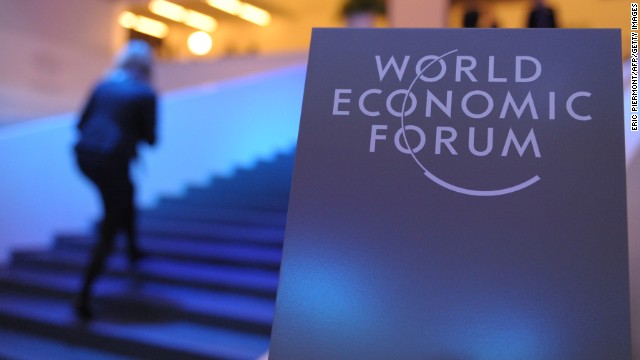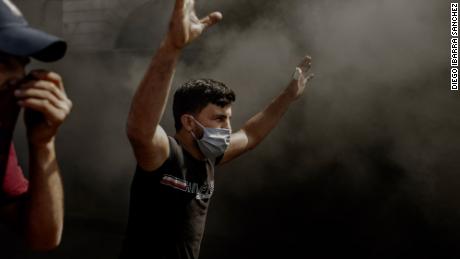I wish all at Davos had spent the week before with me in Yemen

I should say we were live on air at the time. As memory serves, there was a US governor there at the time, too.For those of you who have not been to Davos before or contemplated its magnetic abilities for attracting the great, the good, the global elite, it is a place to be seen and more importantly be heard.Richard ably threads his way through its masses, dispensing questions, dislodging opinions. I, on the other hand, am new to its glamour and otherworldliness, and that's what Richard had in mind when he turned to me toward the end of our conversation."Nic," he said, "you are a Davos virgin, aren't you?"I do enjoy my conversations with Richard: Any moment one fears an unanswerable question will arrive.It's precisely that frisson of unpredictability that was keeping me sharp during our interview as the subzero air was thickening the blood at the back of my head and slowing my thinking.After what seemed like an eternity, Richard asked: "What is your perspective on Davos?" Phew, my brain accelerated again as if it had just been flushed with antifreeze.The theme at this year's forum is "Creating a Shared Future in a Fractured World."Three days earlier I had arrived in Davos during the Swiss Alps resort's heaviest snowfall in almost 20 years — a far cry from the desert of Yemen I just left. For almost a week I had been inside Yemen, reporting on stories that few Western journalists have had access to since the country's civil war began.Along with my CNN team, Joe Sheffer and Sarah El Sirgany, we'd been high in Yemen's mountains, way higher than Davos, on the front lines with government forces just outside the capital of Sanaa. We'd met with child soldiers, doctors, governors frustrated with the government. We'd talked to the war weary, the hungry, interviewed Prime Minister Ahmed bin Dagher and visited the country's ports. But what struck me most is what I saw at the University of Aden.The United Nations describes Yemen as the scene of the worst humanitarian crisis in the world. If ever there were a fracture point on the planet right now, it must be that country.Italian Prime Minister Paolo Gentiloni — whose country bears the brunt of one of the today's great global fractures, migration — spoke passionately here about the issue and the need to tackle its root causes.Tens of thousands of economic migrants trek from sub-Saharan Africa, attracted by the bright economic glow of globalization enriching Europe. Millions of others have fled wars and instability drawn by the same light, willing to risk their lives crossing the Mediterranean in rubber dinghies and unseaworthy fishing boats.Of course, not everyone agrees with him.Wall Street CEOs see fractures differently than others — and they have every right here in Davos to be bullish about assessments of a broad-based global economic recovery and the importance of a return to confidence in US markets.But back to Richard's question. I wished, I said, that some of those Davos participants could have walked a little in my shoes in Yemen and seen what I have seen. Perhaps they might see fractures differently.But as I said what blew me away in Yemen was that visit to the university.I had never seen a 3-D printer before. Yes, I hear you say, perhaps I have been leading a sheltered life, but I thought managing all the apps on my phone was quite an achievement.So you can see where I am going with this.As we were walking on the university campus, I was met by the president and his deputy.They wanted to show me all the great projects the students were working on. Indeed, they had gathered several hundred students into a big hall, each with their own projects. They guided us to what they thought were the more interesting ones. Then Sarah tapped me on the shoulder and said to come look at this, and we walked toward the 3-D printer."And you know what they were making?" I asked Richard. "Prosthetic limbs."They had bought the equipment online from China and had it delivered to a friend in Saudi Arabia, who managed to get it to them. They learned how to operate it from YouTube tutorials.They told me, they don't care about politics — they only want peace and jobs.My point to Richard and those who don't see the fractures I see was that if peace doesn't break out in Yemen soon, these smart young men — and others who can't see a way of realizing their potential at home — will likely end up on boats heading across the Mediterranean, hoping to grasp some of that globalization.Davos is a wonderful forum to bring these issues to the fore, but a trip up Yemen's mountains might benefit some of those here with a greater understanding of the planet beyond the confines of a few blocks in Manhattan.
They guided us to what they thought were the more interesting ones. Then Sarah tapped me on the shoulder and said to come look at this, and we walked toward the 3-D printer."And you know what they were making?" I asked Richard. "Prosthetic limbs."They had bought the equipment online from China and had it delivered to a friend in Saudi Arabia, who managed to get it to them. They learned how to operate it from YouTube tutorials.They told me, they don't care about politics — they only want peace and jobs.My point to Richard and those who don't see the fractures I see was that if peace doesn't break out in Yemen soon, these smart young men — and others who can't see a way of realizing their potential at home — will likely end up on boats heading across the Mediterranean, hoping to grasp some of that globalization.Davos is a wonderful forum to bring these issues to the fore, but a trip up Yemen's mountains might benefit some of those here with a greater understanding of the planet beyond the confines of a few blocks in Manhattan.
Original Article
[contf] [contfnew] 
CNN
[contfnewc] [contfnewc]




